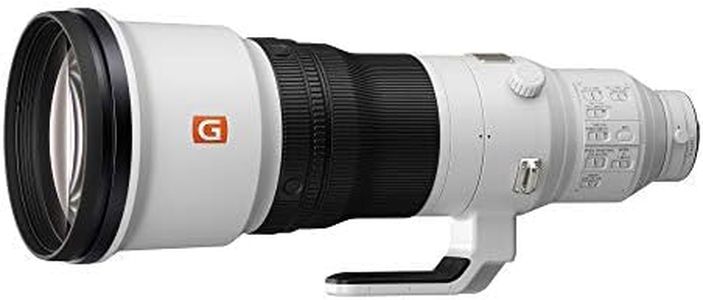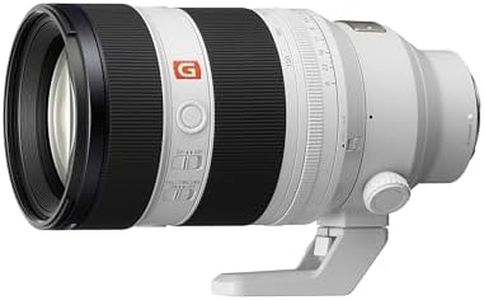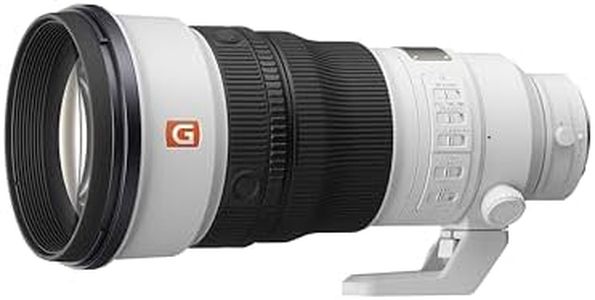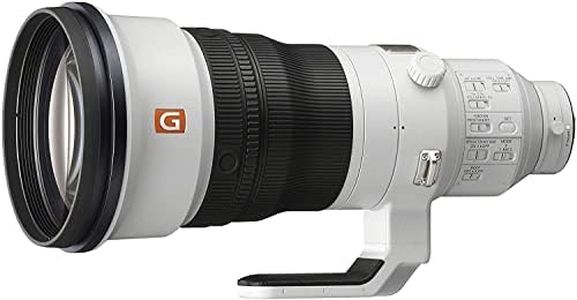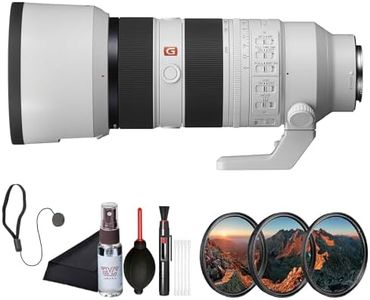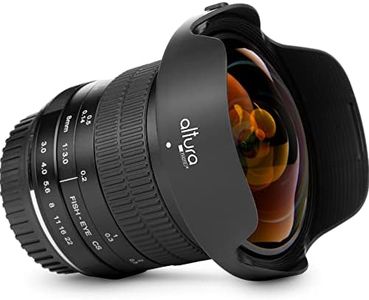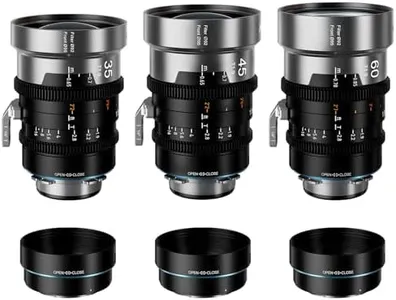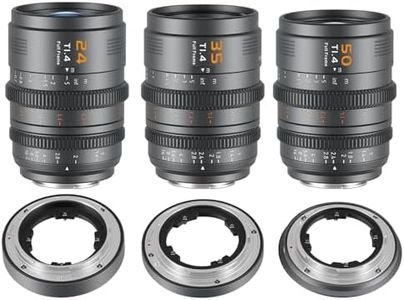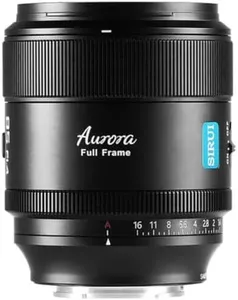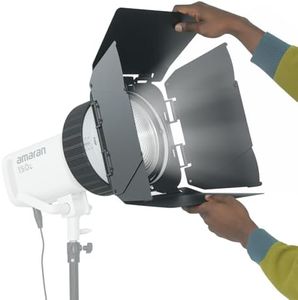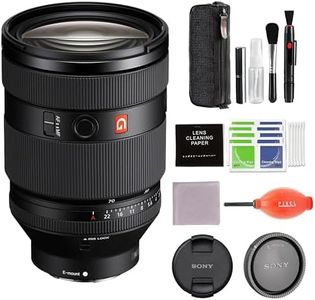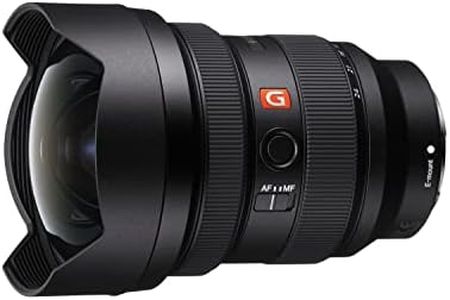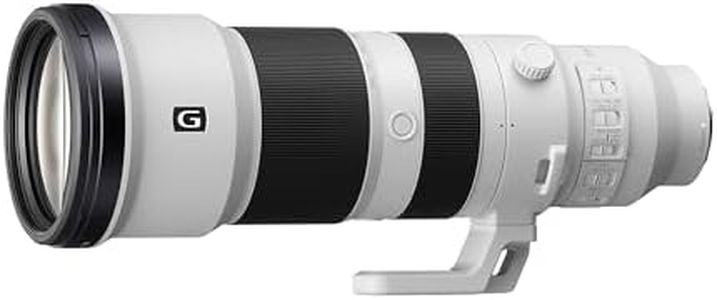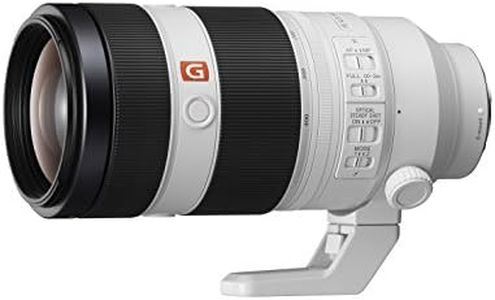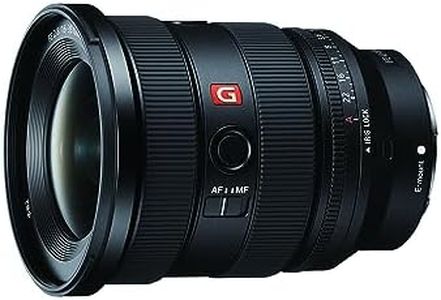10 Best Sony Lenses 2026 in the United States
Our technology thoroughly searches through the online shopping world, reviewing hundreds of sites. We then process and analyze this information, updating in real-time to bring you the latest top-rated products. This way, you always get the best and most current options available.

Our Top Picks
Winner
FE 600mm F4 GM Super Telephoto Lens (SEL600F40GM)
Most important from
5 reviews
The Sony FE 600mm F4 GM Super Telephoto Lens stands out as a top-tier option for those requiring long-range capabilities, like wildlife and sports photographers. Its primary strength lies in its light weight, making it the world’s lightest 600mm super-telephoto lens. This feature can significantly reduce fatigue during long shooting sessions and is complemented by a balanced weight distribution, which helps avoid the 'front heavy' issue common with similar lenses. The large XA element does an excellent job of suppressing spherical aberration, resulting in sharp, high-quality images.
Additionally, the lens features two Extreme Dynamic (XD) Linear Motors that ensure fast, precise, and quiet autofocusing, which is especially useful for capturing fast-moving subjects. The maximum aperture of F4 allows for excellent low-light performance and beautiful background blur (bokeh). On the downside, this lens is likely to be quite expensive, reflecting its advanced technology and high performance. It's also relatively large and might not be the most travel-friendly option for casual photographers.
Lastly, while it’s designed for Sony FE and E mounts, users of other camera brands will have to look elsewhere. This lens is ideal for professional photographers who need exceptional reach and image quality, particularly in fast-paced and challenging environments.
Most important from
5 reviews
Sony FE 50-150 F2 GM
The Sony FE 50-150 F2 GM is an impressive telephoto zoom lens designed for Sony full-frame cameras with FE and E mounts. Its standout feature is the constant F2 aperture throughout the 50-150mm zoom range, which is rare and allows for excellent low-light performance and beautiful background blur, making your subjects really pop. The lens delivers sharp and clear images across all focal lengths, thanks to advanced lens elements and coatings that reduce unwanted reflections and enhance image quality.
Autofocus is fast and accurate, which is great whether you’re shooting photos or recording videos. The lens features internal zooming, meaning the physical size doesn’t change as you zoom in or out, making it easier to handle. Weighing just under 3 pounds, it’s relatively lightweight for this lens class, although it might still feel a bit heavy for casual, all-day use. The lens does not have built-in image stabilization, so you may want to use a camera body with stabilization or a tripod to avoid blur from hand shake.
Ideal for portrait, sports, and event photography, this lens suits users who want professional-level sharpness and beautiful bokeh in a versatile zoom. Its premium features are reflected in a higher price and some extra weight, which might be more than a beginner or budget-conscious user needs.
Sony FE 300mm F2.8 GM OSS
Most important from
10 reviews
The Sony FE 300mm F2.8 GM OSS lens is a strong contender in the telephoto lens category, particularly for those who prioritize image quality and responsiveness. Its lightweight design and excellent balance make it an inviting choice for photographers who need to capture distant subjects without feeling burdened by heavy equipment. The G Master image quality promises sharpness and beautiful bokeh, allowing you to create striking portraits or wildlife photography with ease. The fast and quiet autofocus is another highlight, helping you to focus quickly and accurately, which is essential in dynamic shooting environments.
It’s important to consider that the lens is specifically designed for Sony E mounts, which might limit accessibility for those using other camera brands. While the weight is lighter compared to similar lenses, at 7.48 pounds, it is still on the heavier side, which could be a drawback for extended shooting sessions. Also, while high-quality lenses like this are generally an investment, the price point might be on the higher side for casual photographers or those just starting out in telephoto photography.
For serious enthusiasts or professionals looking for a premium telephoto lens with outstanding optical performance, the Sony FE 300mm F2.8 GM OSS is a fantastic choice. It effectively meets the needs of those requiring a reliable and high-performing lens, but potential buyers should weigh the investment against their specific photography needs and whether they are ready to handle the weight during use.
Most important from
10 reviews
Buying Guide for the Best Sony Lenses
Choosing the right Sony lens for your camera can significantly impact the quality of your photos and videos. The right lens will depend on what you plan to shoot, your experience level, and your personal preferences. Understanding the key specifications of lenses will help you make an informed decision and ensure you get the best fit for your needs.FAQ
Most Popular Categories Right Now
